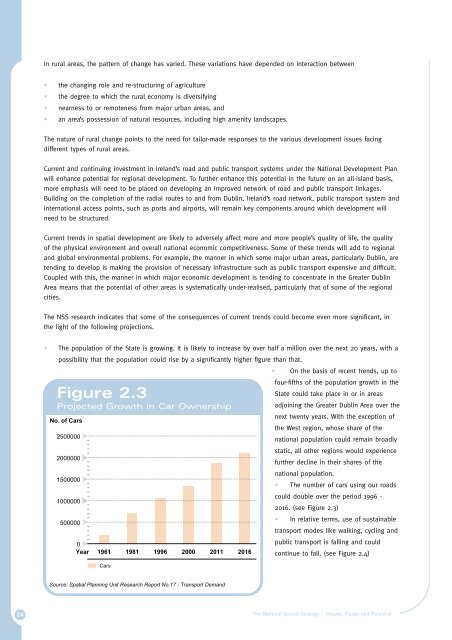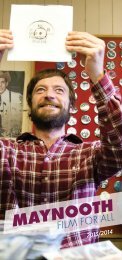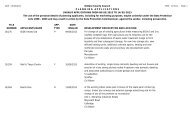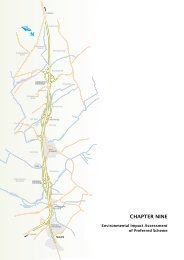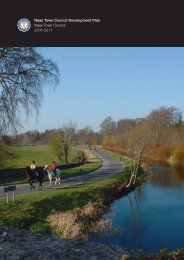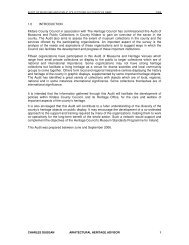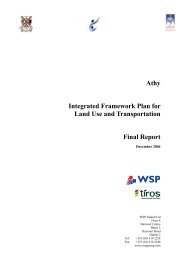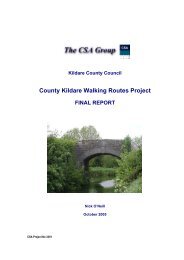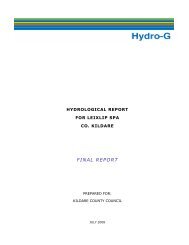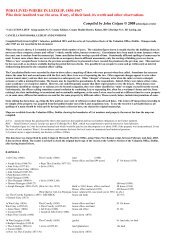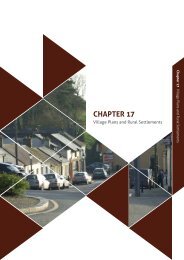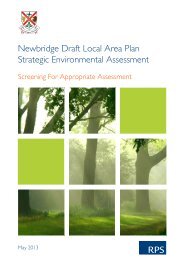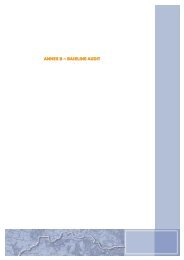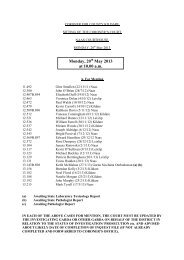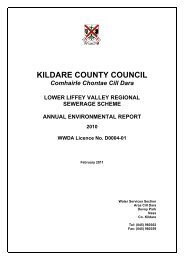National Spatial Strategy For Ireland 2002 - 2020 - Full ... - Kildare.ie
National Spatial Strategy For Ireland 2002 - 2020 - Full ... - Kildare.ie
National Spatial Strategy For Ireland 2002 - 2020 - Full ... - Kildare.ie
Create successful ePaper yourself
Turn your PDF publications into a flip-book with our unique Google optimized e-Paper software.
24<br />
In rural areas, the pattern of change has var<strong>ie</strong>d. These variations have depended on interaction between<br />
• the changing role and re-structuring of agriculture<br />
• the degree to which the rural economy is diversifying<br />
• nearness to or remoteness from major urban areas, and<br />
• an area’s possession of natural resources, including high amenity landscapes.<br />
The nature of rural change points to the need for tailor-made responses to the various development issues facing<br />
different types of rural areas.<br />
Current and continuing investment in <strong>Ireland</strong>’s road and public transport systems under the <strong>National</strong> Development Plan<br />
will enhance potential for regional development. To further enhance this potential in the future on an all-island basis,<br />
more emphasis will need to be placed on developing an improved network of road and public transport linkages.<br />
Building on the completion of the radial routes to and from Dublin, <strong>Ireland</strong>’s road network, public transport system and<br />
international access points, such as ports and airports, will remain key components around which development will<br />
need to be structured.<br />
Current trends in spatial development are likely to adversely affect more and more people’s quality of life, the quality<br />
of the physical environment and overall national economic competitiveness. Some of these trends will add to regional<br />
and global environmental problems. <strong>For</strong> example, the manner in which some major urban areas, particularly Dublin, are<br />
tending to develop is making the provision of necessary infrastructure such as public transport expensive and difficult.<br />
Coupled with this, the manner in which major economic development is tending to concentrate in the Greater Dublin<br />
Area means that the potential of other areas is systematically under-realised, particularly that of some of the regional<br />
cit<strong>ie</strong>s.<br />
The NSS research indicates that some of the consequences of current trends could become even more significant, in<br />
the light of the following projections.<br />
• The population of the State is growing. It is likely to increase by over half a million over the next 20 years, with a<br />
possibility that the population could rise by a significantly higher figure than that.<br />
• On the basis of recent trends, up to<br />
Figure 2.3<br />
four-fifths of the population growth in the<br />
State could take place in or in areas<br />
Projected Growth in Car Ownership<br />
adjoining the Greater Dublin Area over the<br />
No. of Cars<br />
next twenty years. With the exception of<br />
the West region, whose share of the<br />
2500000<br />
national population could remain broadly<br />
static, all other regions would exper<strong>ie</strong>nce<br />
2000000<br />
further decline in their shares of the<br />
national population.<br />
1500000<br />
• The number of cars using our roads<br />
1000000<br />
could double over the period 1996 -<br />
2016. (see Figure 2.3)<br />
500000<br />
• In relative terms, use of sustainable<br />
0<br />
transport modes like walking, cycling and<br />
public transport is falling and could<br />
Year 1961 1981 1996 2000 2011 2016 continue to fall. (see Figure 2.4)<br />
Cars<br />
Source: <strong>Spatial</strong> Planning Unit Research Report No.17 - Transport Demand<br />
The <strong>National</strong> <strong>Spatial</strong> <strong>Strategy</strong> | People, Places and Potential


